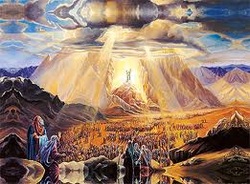And so for me, and I imagine for many others like me, the key to Jewish living is not our religious beliefs but our commitment to a set of practices and values that foster community and continuity.I said that I thought that the article reflected an extreme. After all, most members of Orthodox communities adhere to Orthodox beliefs, I argued.
My friend begged to differ. Many, he said, if not most members of "Modern Orthodoxy" are exactly like that.
"You mean they don't believe in Torah MiSinai? They don't believe in God?"
He seemed to think that they do not. When I insisted that the vast majority of the people that I knew did adhere to these beliefs, he suggested that I'm naive.
There's no doubt that belief in God, and especially the belief in the divine nature of the Torah, has been under attack by Western Culture for many years. I'm so accustomed to it that I tune it out. To what degree the denigrating comments in the media and the sarcastic attitude towards belief in God affects us is an open question.
But if the issue of fundamental belief truly is in danger, then it's time to start talking about it again. As a rabbis (and writer), I've spoken about so many ancillary topics: Torah study, prayer, Israel...the list goes on and on. But when's the last time you were in talk and the rabbi talked about God - and actually mentioned God Himself?
In one of his most famous comments, Rashi quotes the famous question of the Midrash: מה עניין שמיטה אצל הר סיני - "What's the connection between Shemittah and Mount Sinai?" Actually, Rashi's question revolves around the text. The Torah introduces the commandment of Shemittah (to leave the field fallow during the Sabbatical year) unusually: וידבר ה' אל משה בהר סיני לאמר - "And God spoke to Moses on Mount Sinai saying." Throughout most of the Torah, we find the usual introduction: וידבר ה' אל משה לאמר - "And God spoke to Moses saying." Here, the verse emphasizes that this commandment was issued on Sinai. What unique aspect of Shemittah can explain this unusual emphasis?
Interestingly, Rashi explains that it's not about Shemittah at all. Rather, it's about everything else.
It's not just Shemittah. The entire Torah was given at Sinai. All the details of the Oral Torah, and the means to extrapolate those rules to our modern lives, were given by God to Moses at Sinai.אלא מה שמיטה נאמרו כללותיה ופרטותיה ודקדוקיה מסיני, אף כולן נאמרו כללותיהן ודקדוקיהן מסיניRather, just as with regard to Shemittah - all of its rules and details were given at Sinai, so too all [of the commandments] - their rules and details were [also] given at Sinai.
This is a core belief of Judaism - fundamental to the way we live our lives. When we don our tefillin in the morning, sure there's a sense of camaraderie and we're ensuring the future of the Jewish people. But that's not why we put on Tefillin. The Shulchan Aruch writes:
That is why we wear Tefillin.יכוין בהנחתם שצונו הקב"ה להניח ארבע פרשיות אלו שיש בהם יחוד שמו ויציאת מצרים על הזרוע כנגד הלב ועל הראש כנגד המוח כדי שנזכור נסים ונפלאות שעשה עמנו שהם מורים על יחודו ואשר לו הכח והממשלה בעליונים ובתחתונים לעשות בהם כרצונו וישתעבד להקב"ה הנשמה שהיא במוח וגם הלב שהוא עיקר התאוות והמחשבות ובזה יזכור הבורא וימעיט הנאותיוHe should concentrate when he dons [the Tefillin on the fact] that the Holy One blessed is He commanded us to don these four sections [of the Torah], for in them is the unification of His name and the Exodus from Egypt. [And we should place them] on the arm corresponding to the heart and on the head corresponding to the brain so that we remember the miracles and wonder that He did with us, for these teach us about His Oneness, and that He has the power and dominion above and below to do as He wishes. And he should subjugate his soul to the Holy One - which is in the brain and the heart, where the essential thoughts and desires are found, and in this way he will remember the Creator and minimize his desires.
That is what we believe.


No comments:
Post a Comment
Comments transform a blog into a community. Please join.